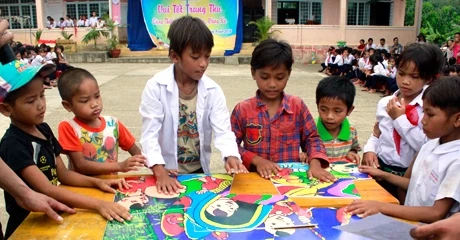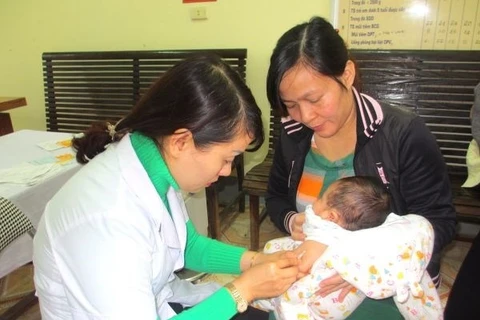HCM City (VNS/VNA) - Hospitals in Ho Chi Minh City have urged parents to pay closer attention to their children this summer following an increase in the number of patient admissions because of accidents.
Summer is the high-risk period for accidents involving children, according to doctors at city hospitals.
Recently, the city’s Paediatrics Hospital 2, for instance, admitted five to six children on average per day because of accidents, including burns from boiling water and gas flames, choking from coins, poisoning from medicine, and drinking of chemicals.
A 15-month-old girl from the Central Highlands province of Gia Lai with two- and three-degree burns covering more than 40 percent of her body was brought to the hospital. She was burned while her mother carried her in arms as she was cooking.
Another patient was transferred from the Dong Nai province General Hospital after her left arm was cut when she fell on a power saw.
The injury was too severe and doctors were forced to amputate the arm, according to the hospital’s doctor.
Last month, doctors at the City Paediatrics Hospital performed emergency surgery on a four-year-old girl from the Mekong Delta province of Vinh Long who had accidentally stabbed herself with pen after falling down while running.
According to the Ministry of Health, an average of 580 children were involved in accidents every day last year.
The city Department of Health’s figures showed that accidents kill around 250 to 300 children aged one to 14 in the city every year.
According to health experts, children aged 2 to 12 are active and almost have no capacity to protect themselves before danger.
Nearly 70 percent of mortalities and 57 percent of injuries could be preventable, they said, adding that parents should take an important role in prevention.
Dr Dao Trung Hieu, deputy head of the city Pediatrics Hospital 1, said that parents should have awareness of teaching children basic knowledge about preventive measures against accidents.
They should create a safe space for their children, especially those under six years old, to play at home.
The Health Environment Management Agency under the Ministry of Health recently issued guidance on ways to prevent injuries and accidents among children, including communication to raise public awareness and skills in creating a safe home.
Children aged 5 to 14 should be taught swimming and skills to prevent drowning, according to the agency.
The agency urges parents who live near rivers, canals, lakes and ponds to install a fence around their homes.
In the Mekong Delta province of Vinh Long, nine children have died due to drowning since the beginning of this year.
Many have lived in houses near rivers without fences. Several of them could swim, but did not have skills to deal with potential drowning incidents.
According to statistics of the Ministry of Labour, Invalids and Social Affairs, around 2,000 children die from drowning each year.
The Ministry of Education and Training has instructed its departments in provinces and cities as well as schools nationwide to improve communication about drowning prevention.
Children have been warned to avoid lakes, canals, rivers, streams and construction holes, and to swim with their parents.
Schools have been encouraged to offer swimming classes and to work with local authorities to identify places with high risk.
Provincial authorities, youth unions and domestic and foreign organisations are carrying out many projects on drowning prevention.
Last month, the Vietnam Sports Administration launched a programme on safe swimming and prevention of drowning that will be offered to children.
The programme includes videos about basic swimming skills, building standard swimming pools, and organising contests for children who are learning swimming and drowning prevention skills.-VNS/VNA
VNA
























